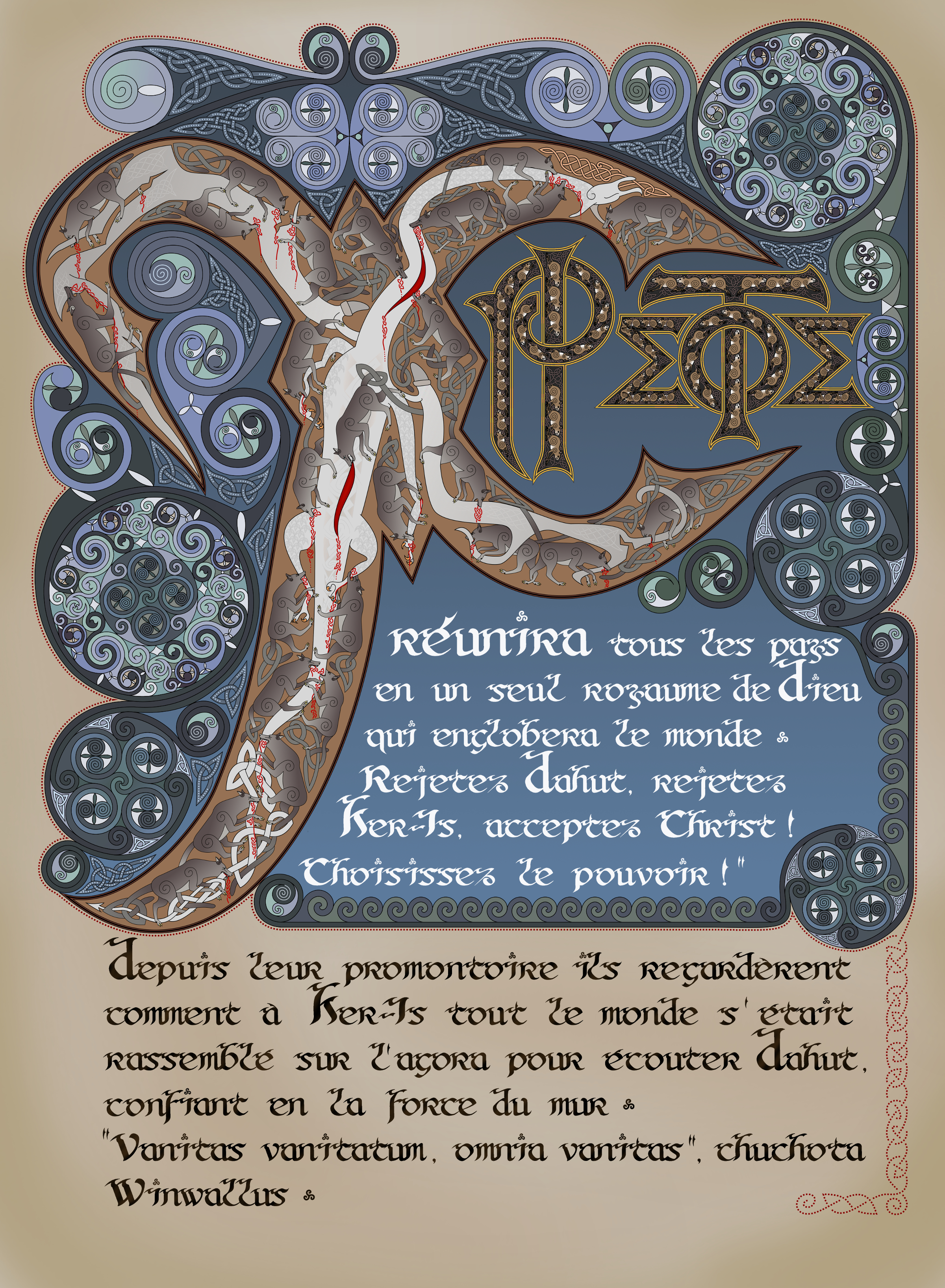fol. 32r
Christos(1) réunira tous les pays en un seul royaume de Dieu qui englobera le monde. Rejetez Dahut, rejetez Ker-Is, acceptez Christ! Choisissez le pouvoir!"
Depuis leur promontoire ils regardèrent comment à Ker-Is tout le monde s'était rassemblé sur l'agora pour écouter Dahut, confiant en la force du mur.
"Vanitas vanitatum, omnia vanitas",(2) chuchota Winwallus.
(1) Le monogramme Chi-Rho se compose des deux premières lettres entrelacées du grec "ΧΡΙΣΤΟΣ" (Christ). Dans les Évangiles insulaires, les pages dites Chi-Rho sont parmi les plus élaborées. Ici, les deux lettres ne forment pas un monogramme, mais sont écrites l'une après l'autre, avec la troisième lettre: XPI. ( Les Évangiles de Lindisfarne f.29r ; Le Livre de Kells f.34r)
Dans ma version j'ai utilisé toutes les lettres de ΧΡΙΣΤΟΣ.
Le X ici, bien sûr, symbolise la "victoire" du christianisme.
Bien que le Théodose mentionné ci-dessus était plutôt tolerant pour les autres religions, des fanatiques catholiques (qui oubliaient assez commodément qu'il n'y a pas si longtemps, ils avaient eux-mêmes été victimes d'intolérance religieuse) ont bientôt commencé à brûler des sanctuaires païens et hérétiques, inaugurant ainsi une période d'effusion de sang monothéiste qui, malheureusement, continue toujours.
(2) Ecclésiaste 1.2: "Vanité des vanités, dit l'Ecclésiaste, vanité des vanités, tout est vanité."
Si on se passe du sousentendu cynique de Winwallus ici, le sens original concernait la contemplation de la superficialité des affaires du monde face à la mort imminente.
fol. 32r
Christos(1) will unite all countries into one kingdom of God that will encompass the world. Reject Dahut, Reject Ker-Is, Accept Christ! Choose power! "
From their promontory they watched how in Ker-Is everyone had gathered on the agora to listen to Dahut, confident in the strength of the wall.
"Vanitas vanitatum, omnia vanitas",(2) whispered Winwallus.
(1) The Chi-Rho monogram consists of the interlaced first two letters of the Greek "ΧΡΙΣΤΟΣ" (Christ). In the Insular Gospels, the so-called Chi-Rho pages are among most elaborate. Here the two letters do not form a monogram, but are written one after the other, together with the third letter: XPI. ( The Lindisfarne Gospels f.29r ; The Book of Kells f.34r)
In my version I used all the letters of ΧΡΙΣΤΟΣ.
The X here, of course, symbolizes the "victory" of Christianity. Though the above mentioned Theodosius was rather easy with other religions, Catholic zealots (who quite conveniently forgot that not so long ago they had been on the recieving end of religious intolerance themselves) soon started to burn pagan and heretic sanctuaries, thus starting a period of monotheistic bloodshed that sadly enough is still going on.
(2) Ecclesiastes 1.2: "Vanity of vanities, saith the Preacher, vanity of vanities, all is vanity."
Without the cynical undertone of Winwallus here, the original meaning concerned the contemplation of the superficiality of worldly matters in the face of impending death.
Cliquez l'image pour une meilleure qualité.
Click on the picture for a better quality.

